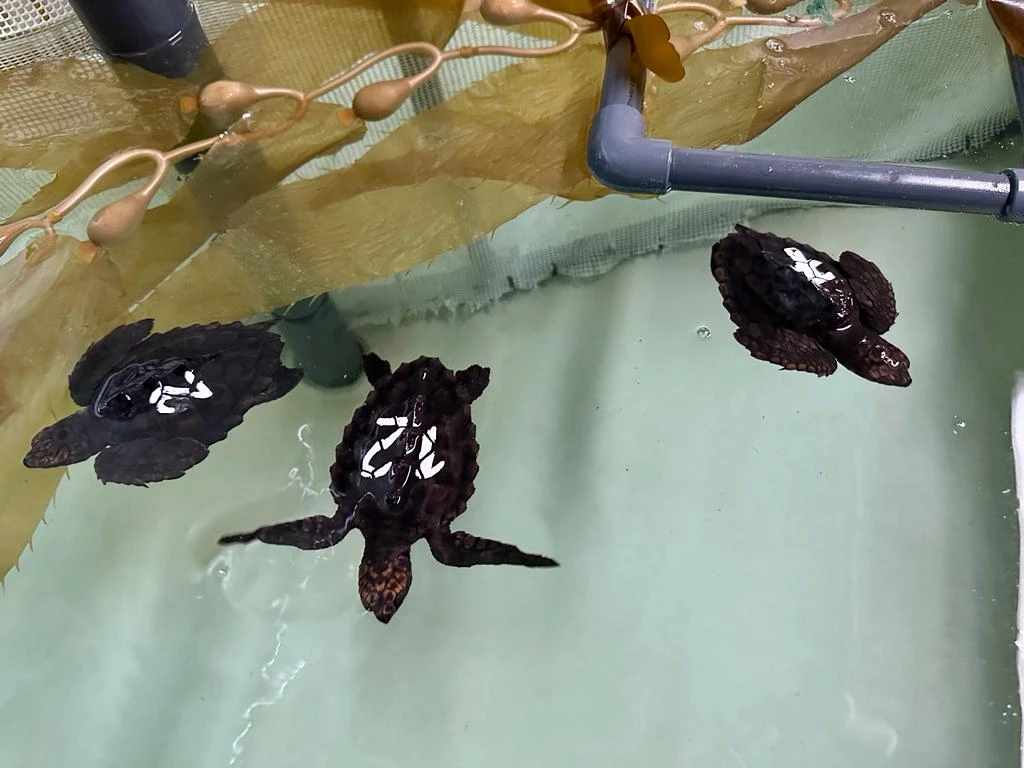It is estimated that only 1 out of every 1,000 sea turtles will survive to adulthood. In order to obtain scientific data and increase their chances of survival, the Head-Starting programme, an initiative set up by the InGeNi-Caretta project, has been introduced throughout Spain. Loggerhead sea turtles (Caretta caretta) are bred and raised under controlled conditions for a year, until they are large enough to be released into their natural habitat. Their size at this stage enables them to be tagged with an identification or satellite transmission chip.
In 2023, 29 nests were recorded on the Spanish coastline, including 6 in the Balearic Islands.
Given the urgent need to improve management plans for this species, the Palma Aquarium Foundation has joined the Head-Starting programme, together with a number of other partners including the Oceanogràfic in Valencia, the CRAM Foundation in Catalonia for the recovery of marine animals, and IRFAP-LIMIA, a laboratory for marine and aquaculture research and part of the Balearic Islands’ Regional Ministry of Agriculture, Fishing and the Environment. The aim is to assess the techniques used in the care of hatchling sea turtles and to create a common database.
The hatchlings used for the study come from the nests located in Can Pere Antoni (Mallorca), Cala Millor (Mallorca), Serrallo (Tarragona), Begur (Girona) and Coma-ruga (Tarragona) that
were formed during the summer 2023 nesting season in Spain.
Watch this
video to see how these animals are cared for.
The Palma Aquarium Foundation cares for 12 hatchling sea turtles
The process consisted of a weekly assessment of their growth and adjustments to their omnivore diet, with ongoing communication between the various centres throughout.
The hatchlings’ diet included squid, hake, sardines and shrimps, algae such as spirulina, as well as calcium and vitamins. Initially, they were fed 10% of their body weight three times a day. They are currently fed 8% of their body weight twice a day, and the food is prepared in chunks which they have to reach by diving.
On hatching, the baby sea turtles weighed approximately
15 grammes and had a straight shell length of some 4 cm. They currently weigh an average
1.5 kg and are approximately 18 cm long. At this size, their chances of survival are higher, and in June 2024 they will be ready for release onto the beaches they came from.
InGeNi-Caretta: a project made up of sea turtle experts
This multidisciplinary project seeks to gain a deeper insight into the colonisation of the
Caretta caretta species in the western Mediterranean. Using the database, the objective is to analyse parameters such as hatchling growth, survival rates and physical ability. Further objectives include identifying optimum handling techniques of sea turtle nests on Spanish Mediterranean beaches and observing the differences between hatchlings from the same nest under different incubation conditions (on the beach and in incubators).
The InGeNi-Caretta consortium, which is responsible for managing this project, is made up of the following partners: the BETA Technology Centre of the Vic Central University of Catalonia, the Biodiversity Research Institute (IRBio) of the University of Barcelona, and Valencia’s Polytechnic University, with the collaboration of the University of Valencia and the Doñana Biological Station. It is also supported by the Biodiversity Foundation of the Spanish Ministry for Ecological Transition and Demographic Challenge (MITECO), within the framework of Spain’s Recovery, Transformation and Resilience Plan (PRTR), financed by the European Union’s NextGenerationEU.


